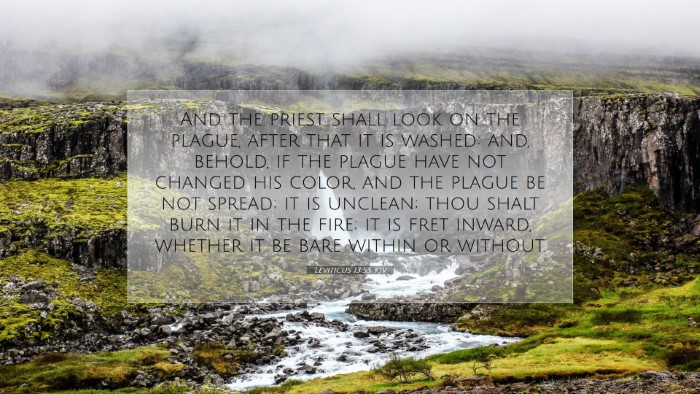Commentary on Leviticus 13:55
Verse Reference: Leviticus 13:55 - "And the priest shall look on the plague after that it is washed, and behold, if the plague be somewhat dark after the washing of it, then he shall rend it out of the garment, or out of the skin, or out of the warp, or out of the woof."
Context and Background
The book of Leviticus is primarily concerned with the holiness of the people of Israel and the instructions God gave regarding ceremonial cleanliness, sacrifices, and moral laws. Chapter 13 specifically addresses laws concerning leprosy and other skin diseases, which were seen as serious afflictions that could render individuals, and at times entire communities, unclean.
Understanding the Hebrew Term for 'Plague'
The term "plague" in this context refers to what is often described as a form of skin disease, possibly including leprosy. Matthew Henry emphasizes that such diseases were often symbolic of spiritual uncleanness. They served as external manifestations of moral or ethical failings, requiring purification not only physically but also spiritually.
The Role of the Priest
In Leviticus 13:55, the responsibility falls on the priest to examine the afflicted area after it has been washed. Albert Barnes notes that the washing signifies an attempt at purification but also acknowledges that ritual cleanliness is distinct from moral purity. The priest acts as a mediator, scrutinizing the purity of both the individual and their possessions.
Significance of the Garment, Skin, Warp, and Woof
The text mentions different materials—garment, skin, warp, and woof—indicating various aspects of life in Israelite society. Adam Clarke highlights that this emphasizes the idea that impurity could infiltrate all aspects of daily life, hence the meticulous nature of these laws. The physical manifestations of disease on fabric or skin serve as reminders that sin and impurity can permeate every dimension of human experience.
The Process of Examination
- Observation: The examination process signifies the need for careful scrutiny in discerning spiritual matters. As Matthew Henry suggests, it represents the need for true diligence in recognizing moral implications in our lives.
- Darkness as a Sign: The mentioning of the “somewhat dark” plague post-washing indicates that some issues may appear resolved outwardly but may still bear a core of unaddressed darkness. Thus, spiritual leadership in the community must remain vigilant in their inspection.
The Implications for Community Living
The broader community implications of this verse can be profound. Albert Barnes asserts that these prescriptions were not solely for individual health but were meant to protect the entire community from spiritual contamination. The community’s commitment to maintaining purity serves to draw them closer to God as a collective.
Application for Today’s Believers
For contemporary believers, Leviticus 13:55 prompts a reflection on personal and communal purity. Adam Clarke encourages today’s readers to consider whether they are also self-examining for signs of spiritual disease or moral decline in their lives and communities. The priestly role in our lives today involves careful discernment, accountability, and offering opportunities for restoration.
Conclusion
In conclusion, Leviticus 13:55 serves as a multifaceted guide in understanding the significance of spiritual and physical cleanliness. It reminds believers that careful examination and accountability play vital roles in communal holiness and individual integrity. The insights from Matthew Henry, Albert Barnes, and Adam Clarke reinforce the need for vigilance, sincerity, and community unification against moral and spiritual contamination.


